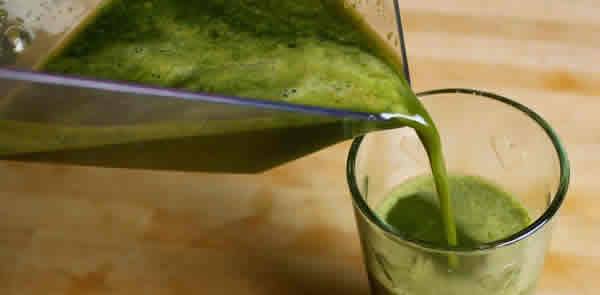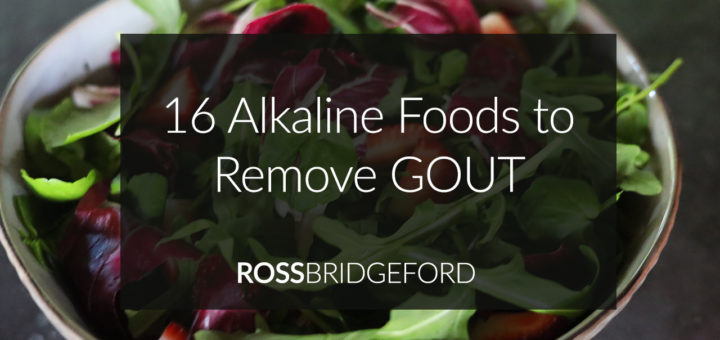16 Most Alkaline Foods for Gout
The 16 Most Alkaline Foods for Gout Relief
Gout is an excess-acid condition. The more acidic your diet, and the most acidic waste your body has to store, the greater your risk of gout.
In this article you will learn the most effective alkaline foods for gout, to fight this acid build-up. And you will learn how to restore balance to the body, so the pain can be well and truly in your past.
Plus, as ever, all of my suggestions are research-based and you can find the references at the end.
OK, let’s crack on and get gout out for good!
What is Gout?
By definition, gout is a build-up of uric acid in your body.
This is one of several acids that can build up and cause an imbalance in your body: uric acid, lactic acid, pyruvic acid, and acetic acid.
When the uric acid produced is more than the body can process and remove, it is store away where it cannot do immediate harm (away from your vital organs), and this is where the problems start.
The vast majority of this buildup comes from the foods you eat (and drink), and their reaction during digestion.
Some foods will have an alkaline-forming effect on the body, whereas others will create acidity in the body.
In a Cliff Notes explanation(!) for alkaline-forming, think fresh foods (greens, veggies, healthy fats, nuts, seeds, etc.) and for acid-forming think NON-fresh foods (sugar, gluten, packaged foods, processed foods, preservatives, additives, takeaways, soda, and so on.
The Impact an Acid-Forming Effect Has on the Body
The human body has evolved with an acid buffering system that can deal with the modest levels of acid produced during metabolism, and the digestion of some foods.
When well-meaning, ill-informed people say “you don’t have to eat alkaline because the body balances your pH for you”, they are dangerously only half right.
The body CAN maintain some degree of acid-buffering. But we did not evolve with this degree of sugar, gluten, preservatives, caffeine, alcohol, fast foods, and so on, and so the body can become quickly overwhelmed.
Just think of a comparison to what breakfast might have looked like a thousand years ago…fruits, berries, leaves, fibre…
And compared to a typical ‘standard Western breakfast’ now of gluten, sugar, processed meats, dairy, caffeine, trans fats (think gluten-containing bread, cereals, bagels, margarine, jam, bacon, fried eggs, coffee, milk, fruit juices and so on).
The purpose of eating alkaline is NOT to change your pH to be more alkaline. The purpose is to allow your body to effortlessly maintain your ideal blood pH at around 7.365. (for more info on this process in the body read my guide here)
What Happens When the Body Has Too Much Acidity to Handle (and What This Means for Gout)?
When your food and drink intake is predominantly acid-forming this overwhelms the body’s capacity to buffer it. We are then left with an excess of acids that need to be dealt with.
The body will go into emergency mode, dropping other vital processes (temporarily) to help neutralize this acidity, but any that can’t be neutralized or eliminated will be stored.
This is gout. It is an excess of uric acid that the body cannot eliminate, and it is stored.
It is NOT a build-up of calcium or magnesium.
Unfortunately for this excess acid, it needs somewhere to ‘hang-out’ and so will be stored in the soft tissues around joints (knees, ankles, hands etc.).
This will cause pain and inflammation around the joints, often over hours or days. For most people, it is your big toe that gets targeted by gout first.
This is because there are fewer big toe joints than all the other joints in the body combined, so they become a prime location for excess uric acid to end up.
So what you’re left with is excruciating pain (sometimes at night), for several days, in almost exactly the same place each time it happens.
This is gout.
Eating Alkaline Foods for Gout Relief is PROVEN:
Here are just a handful of research papers from well-respected journals (such as the Nutrition Journal and the Journal of Nephrology):
Title: Effect of urine pH changed by dietary intervention on uric acid clearance mechanism of pH-dependent excretion of urinary uric acid.
Conclusion: We conclude that alkalization of urine by eating nutritionally well-designed alkaline -prone food is effective for removing uric acid from the body.
Title: Effect of urine pH on uric acid excretion by manipulating food materials.
Conclusion: We have shown that urine alkalization facilitates uric acid excretion.
Title: Urine pH and uric acid excretion.
Conclusion: We tentatively conclude that dietary intervention may well be the safest and the most economical way for the prevention of hyperuricemia.
How Acidic Foods Impact Gout
The next big question…what do you eat? And perhaps just as importantly, what do you avoid?
I always start with the foods I want you to add in first because it is much more doable to add good stuff in, rather than have your first step to cut the bad stuff out. Because let’s face it – oftentimes a lot of the ‘bad stuff’ is the stuff you crave.
So we ease the pressure, remove craving stress and big changes to your routine, and simply add a ton of the good stuff first.
Big Picture, You’ll Be Removing or Limiting Acid-Forming Foods as a Whole
Think sugar, gluten, processed foods, fast foods, trans fats, takeaways, chocolate, alcohol, coffee, dairy, processed meats, takeaway, pizza, chips, soda, and so on.
These are all acid-forming foods.
And ideally, you’ll look to reduce the amount of these you are consuming.
But first, there is no pressure or stress to do that. What I want you to do first is dramatically increase your intake of the following NINE alkaline-forming, gout-removing foods.
The 16 Most Alkaline Foods For Gout
These alkaline foods are high in alkaline minerals, vitamins, electrolytes, antioxidants, natural anti-inflammatories and they will seriously help your gout.
They will infuse your body with readily usable alkaline stores to not only fight any further uric acid build-up but also to break down and remove the uric acid that is already there.
Let’s get into what they are, and how you can incorporate them into your diet.
#1: Watercress
This is a surprising ‘superfood’ because it’s low in calories and has so many incredible health benefits.
This dark green leafy plant is high in minerals, vitamins, enzymes, fibre, protein and beta-carotene. It also contains the alkaline mineral boron which studies have shown can reduce uric acid levels by up to 50%.
Watercress also contains vitamin C which is an antioxidant that can help fight gout.
It should be enjoyed raw or lightly steamed and added to salads, sandwiches, soups etc., or as a garnish, on any dish, you are cooking.
It’s easy to grow your own watercress. You can buy seeds or young plants and they’ll require a shallow tray of water, some sunshine and 2-3 weeks for them to grow big enough to use in your gout fighting diet.
#2: Kelp
Kelp is a type of seaweed (it is not the same as the salt you can consume, so don’t worry!) that is low in calories but high in nutrients.
It contains minerals including iodine and iron, vitamins B12 and B6, magnesium, calcium, phosphorus and selenium.
Kelp also contains an active form of fluoride known as sodium alginate which has been shown in studies to help reduce uric acid levels by up to 36%.
It can be enjoyed in salads, soups or as an addition to any dish. It has a unique flavour so you may want to test it out before using it regularly.
#3: Avocado
In terms of the most alkaline foods for gout relief – avocado has to be near the top. Due to its glutathione content, avocados are perhaps one of the best foods you can consume to fight gout.
This is because glutathione helps prevent uric acid crystals from forming in the joints, and therefore stops gouty arthritis from reoccurring.
To enjoy the benefits of avocado, try adding it to salads or smoothies. You could also mash it up with some lemon juice and sea salt, and use it as a spread on gluten-free bread or rice cakes.
#4: Turmeric
This is a spice that is well-known for its incredible anti-inflammatory properties.
Research shows that turmeric can reduce inflammation by up to 30%.
It also contains curcumin, an active compound that has been shown in studies to help reduce uric acid levels by 70% and fight gout symptoms.
#5: Coconut Oil
This is a superfood that, due to its incredible antioxidant and anti-inflammatory properties, helps fight gout and prevent further uric acid buildup.
It contains fatty acids (including medium-chain triglycerides) which studies have shown can help reduce blood uric acid levels by 80%. It also contains lauric acid which has been shown in studies to help reduce uric acid levels by 70%.
Coconut oil can be enjoyed as a healthy cooking fat, or simply added to your foods such as oatmeal, smoothies and so on.
#6: Wild Salmon
Salmon is an excellent source of protein and omega-3 fatty acids.
These are essential fatty acids that studies have shown can reduce blood uric acid levels by up to 52%.
Wild salmon also contains astaxanthin, a powerful antioxidant that is not always found in farmed salmon.
This gives wild salmon the ability to kill the harmful free radicals created when your body breaks down the uric acid in your joints.
Wild salmon can be enjoyed in salads, sandwiches and as a protein source with your veggies for dinner.
#7: Garlic
Garlic is a member of the Allium family (the same family which includes onions, leeks and shallots) and it contains allicin , a sulphur-containing compound which studies have shown can reduce uric acid levels by 40%.
It’s best enjoyed raw and crushed into dressings, sauces and dips.
This allows the allicin to be released so you get its full benefits.
Garlic is also an excellent immune system booster as it contains Vitamin C, iron and manganese, and is high in fibre.
#8: Almonds
Research has found that eating just an ounce of almonds per day can reduce uric acid levels by up to 40%.
This is because almonds are high in magnesium and potassium, both of which help ‘flush’ excess acids out of the body.
And another great reason to snack on nuts is that they also contain L-arginine, an amino acid that can help reduce uric acid levels.
You’ll want to aim for one ounce per day. What I recommend is having a small handful of almonds either as a healthy snack during the day or as part of your pre-bed meal.
#9: Buckwheat
This is an ancient gluten-free grain, but it is actually not a grain at all. It’s part of the rhubarb family, and I always recommend it to anyone with gout or arthritis because it is so high in nutrients.
It has a low GI rating which means that it stabilises blood sugars, but also has properties known to reduce inflammation in your body.
You can soak buckwheat overnight, then cook it into a healthy breakfast cereal, or just add it to soups, salads and even stir-fries.
#10: Pumpkin Seeds
These are packed with nutrients including magnesium which helps fight gout as well as high zinc levels that may help reduce uric acid production.
You’ll want to eat about a quarter cup of seeds each day. I recommend either adding them to salads, muesli or smoothies.
#11: Spinach
Spinach is one of the most alkaline foods for gout removal because it is packed with alkaline nutrients including potassium which helps fight gout by flushing acids through your system. It’s also rich in healthy omega-3, chlorophyll and fibre, which helps support the liver.
You’ll want to eat it in salads, stir-fries, soups etc., or you can even add it to any blended smoothies.
#12: Swiss Chard
This is another leafy green vegetable that has loads of vitamins and minerals including magnesium which helps fight gout by flushing uric acid out through your kidneys.
You’ll want to enjoy this as a side dish, or as part of any other recipes you make up.
#13: Oats
A lot of people are surprised by this but oats are alkaline-forming despite being a grain.
That’s because they contain so many vitamins and minerals such as magnesium, potassium and zinc which help fight gout by removing acids from the body. Plus oats also help to reduce inflammation in your body.
You’ll want to enjoy them cooked into breakfast cereals or just add them to smoothies or salads for a healthy lunch option.
#14: Celery
Celery contains the alkaline mineral sodium which helps fight gout by flushing acids from your body.
It also contains vitamins A and C to help nourish your joints, and vitamin K, another alkalising nutrient that can reduce inflammation in your body.
Celery also contains several compounds that studies show can reduce uric acid levels by up to 50%.
These include apigenin, luteolin, chlorogenic acid, quercetin and kaempferol. Celery also contains the alkaline mineral potassium which can help fight gout and lower uric acid levels.
You’ll want to add celery to all of your soups, stews and stir-fries for a simple way to alkalise your meals.
#15: Ginger
Ginger is well known for its anti-inflammatory properties which makes it great for people with conditions like arthritis and gout where inflammation can be severe.
It also contains the alkaline mineral potassium which helps fight gout by flushing acid from your body and is highly anti-inflammatory.
You can add ginger to smoothies, stir-fries and soups for a powerful way to alkalise your meals.
#16: Cinnamon
Cinnamon contains the alkaline mineral chromium which helps fight gout by helping insulin function properly in your body.
It also has strong anti-inflammatory and antioxidant properties.
You can add it to smoothies, and enjoy it with fruit and nuts as a healthy breakfast option or even in soups and stews.
By adding these foods into your diet, a few each day, you’ll quickly see your gout symptoms disappearing.
The combination of anti-inflammatory, alkaline, acid-removing nutrients in these foods works so effectively, and quickly.
And the few foods to focus on avoiding:
As I mentioned, you don’t need to really worry about eliminating everything all at once, or certainly, you don’t need to try and aim for perfection. If you add the good stuff in you’ll get great results, and once you’ve built up some momentum and confidence you can start working on removing stuff too.
And this is where I would start with reducing the following to heal gout:
Fruit juices and concentrated fructose (including dried fruits):
Fructose is metabolised specifically by our liver. Other sugars such as glucose are metabolised by ALL of our cells and therefore, fructose consumption stresses the liver massively. When you consume a lot of fructose (regular sugars are 50% fructose, 50% glucose, high fructose corn syrup in sodas and other foods are 100% fructose, fruit is 100% fructose and so on) this causes a cascade of health issues.
This not only leads to high production of uric acid but also leads to insulin resistance, metabolic syndrome, chronic fatigue and a super-high incidence of non-alcoholic fatty liver disease (NAFLD).
The stress fructose causes to the liver means that it spends so much energy turning fructose into other molecules that it has no energy remaining to undertake all of it’s other functions, including having less energy to remove excess uric acid from our body.
While 1-3 pieces of fresh (preferably organic) pieces of fruit per day are totally fine, you should be looking to avoid fruit juices, dried fruit, and sugars and sweeteners that contain concentrated fructose including honey, maple syrup, coconut syrup, agave syrup etc.
For more on my guide to sugars and sweeteners click here.
White Flour:
White flour contains gluten which is another type of protein that can trigger an attack. So it’s best to eliminate this as much as possible.
The gluten in flour causes a huge spike in inflammation and insulin levels, and this spike causes rapid production of uric acid.
Wheat (and all gluten-containing grains) are the biggest contributors to inflammation in our diet, and inflammation is at the root cause, alongside excess acidity, of practically every health challenge we face, from cancer to heart disease and indeed gout.
Alcohol:
Alcohol consumption increases the risk of gout because alcohol metabolises into purines – a substance that triggers a gout flare-up.
Other problems with alcohol include:
- The acid in drinks like beer and wine causes a lot of irritation to the already inflamed and irritated joints caused by gout.
- Alcohol can cause your liver to become congested and this, in turn, affects the liver’s ability to remove uric acid from the body, thus increasing levels of uric acid in the blood.
- It also leads to deficiencies in essential minerals and nutrients that are required to maintain healthy uric acid levels in the body, such as zinc and vitamin B6
- Alcohol is acidic so when you drink it, our bodies will attempt to eliminate it in the urine, increasing acid production which causes an increase in uric acid levels.
- This doesn’t mean you need to cut out alcohol 100% but it’s best to be aware of this connection and avoid excessive intake.
While you will want to cut back on these as much as possible, I want you to remember that the very best place to start is by adding the good stuff in first!
A Great Start: Have THIS Alkaline Juice Daily
The Uric Acid Removing Juice
Serves 2
Preparation Time: 5 minutes
Ingredients:
- 3 large kale leaves (any variety)
- 2 sticks of celery (including leaves)
- 1 cucumber
- 1 handful of watercress or rocket (arugula)
- ½ inch of fresh root ginger
- ½ inch of fresh turmeric
- Squeeze of ¼ fresh lemon
- 250ml of filtered water
Instructions
- Thoroughly wash all ingredients and then chop the celery into small pieces so it does not clog up your juicer
- Juice everything except for the lemon
- Once juiced, run the water through the juicer to wash through any remaining juice and nutrients
- Squeeze in the lemon and stir through
- Serve!

This juice is full of alkaline foods for gout relief that is almost instant. It’s alkaline, mineral-rich and will increase the alkalinity of your urine. This will help expel excess uric-acid and break down painful crystals.
Feel free to have it daily, until you feel relief, or even more than once per day.
There are 4-5 serves of fresh vegetables per serve in this one drink!






hey!!! thank you so much for such a piece of informative article. Good and interesting information about alkaline foods
Dear Ross, I read where this Uric Acid Juice is supposed to be almost instant with gout relief. I have been taking a glass of this Uric Acid removing juice, and celery juice and whole lemon/1 C blueberry juice daily for two weeks now and have just had another severe gout attack where I have to take my daily allopurinol and fortify this with colchicene in order for the excruciating pain to eventually stop over a week.
How long do you think it will take for the juicing to kick in and stop this chronic gout?
With painfully loving regards, Jack Miller
Hi Ross
It’s 2:21 am and I’ve been up over an hour.
Gout is killing me. And this flareup I only sense starting.
I just read your list and suggestions and will be doing something about this problem starting today.
At 60, I’ve only had gout a couple years and I’m sick of it. My attacks are always a week long.
I always figured I was getting hurt playing hockey…what a dummy.
Thanks for the inspiration!
Matt
Gaut is killing me I want to try this instructions of yours.
What is the permanent solution to end gout.
Thank you so much for this information. I will get on this regimen as soon as I can go to store! Appreciate it!
I was eating a large amount of vegetables, especially dark green vegetables and also almonds to make sure I was getting enough calcium. I have avoided gluten , dairy and sugar for years as I have MS and had been diagnosed with osteoporosis a few years ago. Despite my healthy diet I was diagnosed with kidney stones last year and have to avoid high oxalate foods and been told to add some dairy as that is supposed to help neutralise oxalates.
Your suggested foods are mostly high oxalate although I really like these.
How do I solve my dilemma, as I was told I had probably not helped myself eating the way I was?
I’ve had a swollen toe joint , gout, for the last 2 yrs & a few months back i got a fungal infection which showed up in excessive chunks of dandruff and fluid oozing from the ear. Aug 10th I started a full alkaline cleanse:
cucumber + lemon juice 1.5 — 2 liters
3 liters of 10.5 alkaline water (miracle max)
cucumber & tomato for lunch & dinner
600cc of cucumber, ginger, spinach, parsley, celery, lemon juice in the evening
1-2 scoops of 4salts in alkaline water + 1 lemon
I’ve been doing this almost daily and eating nothing else. Still, its not gone — its better but not gone.
Can you give any recommendation or ideas or insight into how long it’ll take, anything i can do to accelerate the healing/cleansing, any insight into how i can speed it up?
thank you
I would like to thank you for the e mails you have kindly sent me.
I have suffered with arthritis for many years, had surgery on my hands,( bi.lateral trapeziaectumy and ligament reconstructikn) however always declined steroid injections in relation to my feet.
I bought a water filter that takes out most flouride, and have looked at various elements of my diet…but had never truly linked the alkalinity of my blood and what this really means!!
So…Thank you again!!
Hi I am a long term raw fooder (author of 5 raw food books) but at age 78, I fell off the raw wagon several years ago. Still eating lots of raw but added in some items from the SAD diet over time.
I do not have gout, but have recently been diagnosed with Kidney disease. Early stage. It appears to me that your food suggestions are all valid for my situation but thought it would be a good idea to check in with you -thank you!
I do not eat gluten -gluten intolerant
PS. I would appreciate it if you will keep my query confidential.